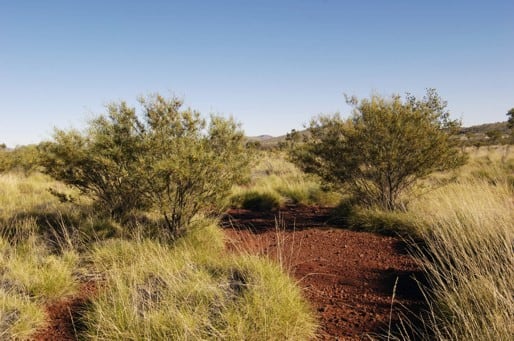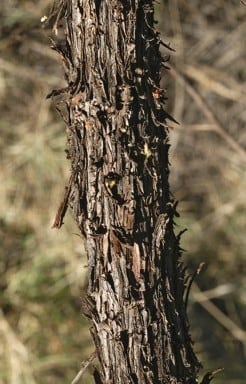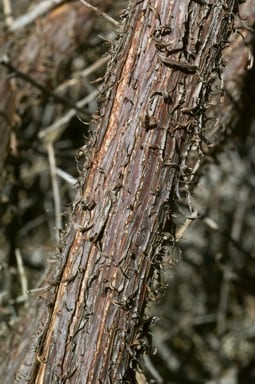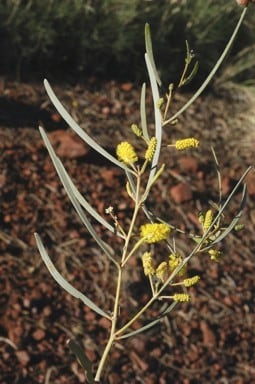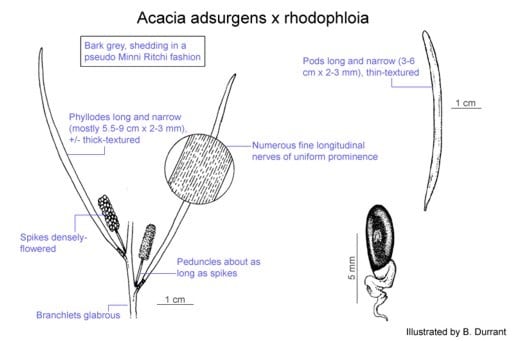Acacia adsurgens Maiden x Acacia rhodophloia Maslin
WATTLE
Acacias of Australia
Family
Fabaceae
Distribution
Occurs in the Pilbara region in north-western W.A. where it is found in the central Hamersley Ra. between Newman and Tom Price; also recorded from the Gibson Desert (W.A.) and seemingly also the Tanami Desert (N.T.).
Description
Openly branched, multistemmed shrub 1.5–4 m high. Bark grey, fibrous or exfoliating in a pseudo ‘Minni Ritchi’ fashion (i.e. exfoliating in narrow shavings that are shallowly recurved at each end) at base of main stems. Branchlets glabrous, smooth. Phyllodes linear, straight to shallowly incurved, erect, flat, coarsely pungent, (4–) 5.5–9 (–10) cm long, 2–3 (–4) mm wide, somewhat thickly coriaceous, sub-rigid, resinous, glabrous or with microscopic hairlets; longitudinal nerves numerous, fine, close together and of uniform prominence. Inflorescences simple or rudimentary racemes 1–5 mm long; peduncles 7–15 mm long (about as long as the spikes), glabrous; spikes 10–20 mm long, yellow, the flowers densely arranged. Flowers 5-merous; calyx ½–¾ length of corolla, shortly dissected into triangular lobes. Pods linear, 3–6 cm long, 2–3 mm wide, thinly crustaceous, glabrous. Seeds longitudinal, obloid, 4–5 mm long, 2 mm wide; aril rather obvious and folded beneath the seed, white to cream.
Phenology
Flowers April–Aug.
Habitat
In the Pilbara it grows mostly on stony loam at base of gentle slopes, on sides of low hills and along creek lines; in the Gibson Desert it grows on deep red sand.
Specimens
W.A.: 5 km N of Gunbarrel Hwy along Gary Hwy, Gibson Desert Nat. Res., S.D.Hopper 2800 (PERTH); 5 km S of Karajini Natl Park rangers residence on rd to Juna Downs, B.R.Maslin 8825 (PERTH). N.T.: The Granites Tenements, Tanami Desert, A.C.Kalotas 1724 (PERTH).
Notes
While morphological characters (especially the bark) suggest that specimens referred to this entity are hybrids involving A. adsurgens and A. rhodophloia there are no records of it growing with the presumed parents. This entity may be easily confused with A. adsurgens or narrow phyllode forms of A. rhodophloia on account of its long, linear, multistriate phyllodes, spicate inflorescences and narrow pods. However, A. adsurgens can be recognized by its phyllodes that possess a central nerve which is more pronounced than the other nerves, and A. rhodophloia by its red ‘Minni Ritchi’ bark that commonly extends to the branchlets. See B.R.Maslin et al., Wattles of the Pilbara CD-ROM (2010), for further discussion.
FOA Reference
Flora of Australia Project
Author
B.R.Maslin
This identification key and fact sheets are available as a mobile application:
URL: https://apps.lucidcentral.org/wattle/
© Copyright 2018. All rights reserved.
